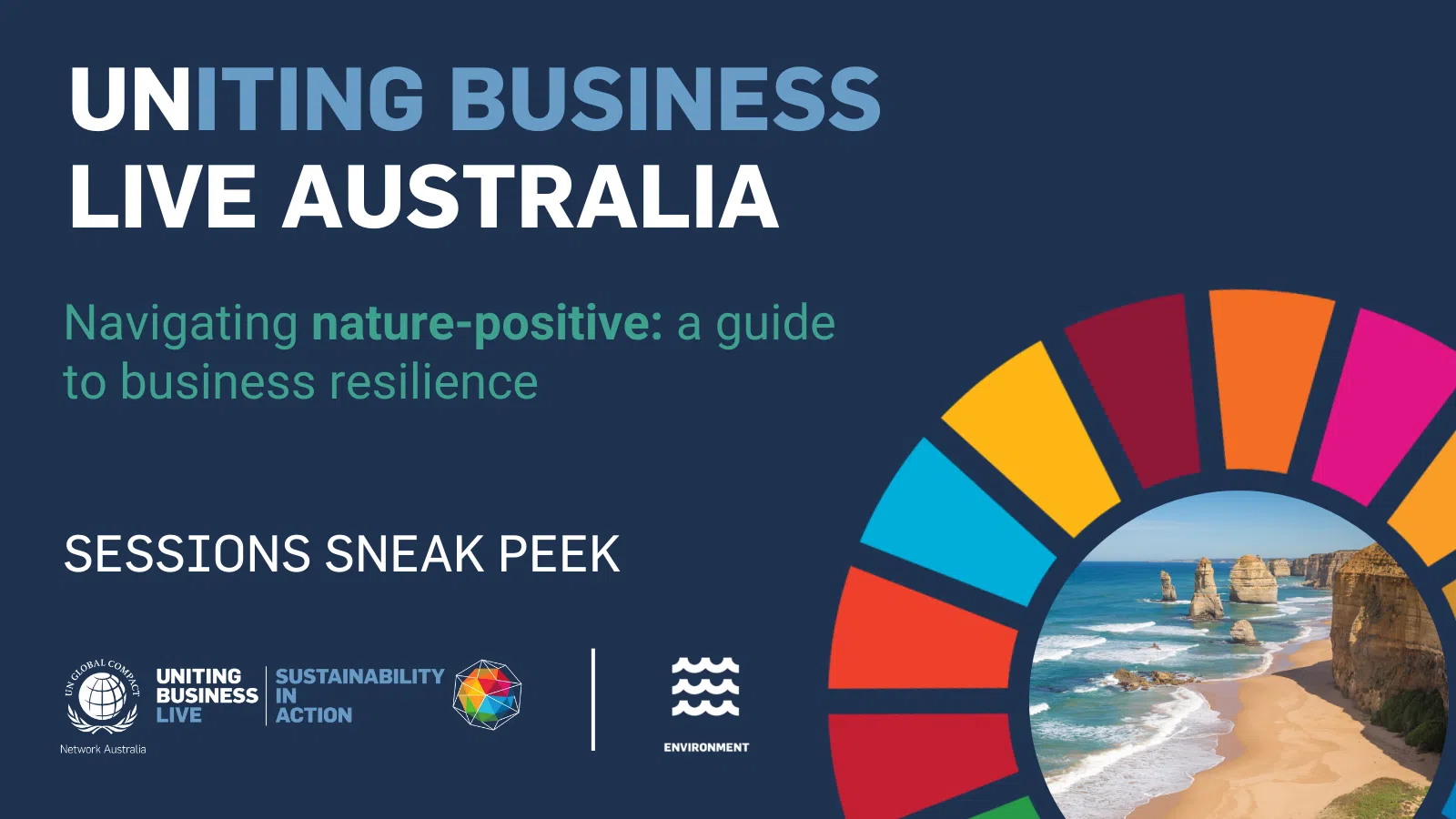
Blogs, Environment & Climate Change, Events
Blog | Navigating nature-positive: a guide to business resilience
Dr Evan Center | September 30, 2024
In this blog, we delve into the definition of nature-positive, examine its transformative impact on businesses, and discuss the evolving landscape of nature-related domestic policies. Get a sneak peek into topics that will be further explored at our UNiting Business LIVE Australia conference.
What is ‘nature-positive’ and why is it important?
- The term ‘nature-positive’ is conceptually identical in terms of desired outcomes to the 2030 mission of the Kunming-Montreal Global Biodiversity Framework (GBF) – with a regenerative imperative to halt and reverse biodiversity loss to put nature on a path to recovery.
- By integrating nature-positive strategies, businesses in Australia can not only mitigate their environmental impact but also gain a competitive edge, enhance their reputation, and ensure long-term viability in a rapidly evolving global market.
To support nature-positive progress, the Australian Government has:
- committed to protect 30% of Australia’s land and seas by 2030, which is in line with the 30X30 (30% by 2030) ambition of the GBF
- implemented a nature repair market
- established an independent Environment Protection Agency (EPA) and
- partnered with First Nations businesses and communities to develop legislation on cultural heritage protection.
What does this mean for business?
At the recent Business and Biodiversity Networking evening hosted by the UN Global Compact Network Australia (UNGCNA), the topic of discussion was natural capital accounting and the growing need to rethink how businesses account for nature’s value.
The conversation emphasised the shift from reporting on traditional financial metrics to understanding nature’s impact and using data to drive meaningful decisions.
To truly grasp the implications of natural capital accounting, it is essential to first unpack the concept of nature-positive. Upcoming global events like COP16, the Global Nature Positive Summit, and our own UNiting Business LIVE Australia conference, make this conversation more timely than ever – offering a critical opportunity for businesses to align with nature-positive goals on a global scale.
Unpacking nature-positive
Climate change, habitat loss, pollution, and invasive species are all driving environmental degradation. The World Economic Forum’s (WEF) report on Global Risks identified biodiversity loss and ecosystem destruction as major threats to humanity before 2030. The 2021 Australian State of Environment Report highlighted the extreme pressure on the region’s environment. In response to these challenges, the term ‘nature positive’ has emerged, often referred to as the “new net-zero” in public discourse.
While not explicitly mentioned in the Global Biodiversity Framework, the term ‘nature positive’ is conceptually identical in terms of desired outcomes to the 2030 mission of the Global Biodiversity Framework (GBF) – with a regenerative imperative to halt and reverse biodiversity loss to put nature on a path to recovery. In this manner, the term ‘nature positive’ can be conceptualised as a global goal to regenerate nature by halting and reversing nature loss by 2030 and achieving a full recovery by 2050. This includes setting measurable net-positive biodiversity outcomes, such as improving the abundance, integrity and resilience of species, ecosystems and natural processes.
Nature-positive impacts on businesses
The Taskforce for Nature-Related Financial Disclosures (TNFD) addresses the multitude of nature-related risks that face the private sector – including the loss of raw materials, supply chain disruptions caused by extreme weather, and market risks arising from legislation and customer perception changes.
In the face of escalating climate change, biodiversity loss, and evolving regulatory frameworks, it has become essential for businesses to assess their relationship with nature. Understanding their dependencies, impacts, and risks is not only key to mitigating potential threats but also important for identifying opportunities to contribute to nature restoration and meet stakeholder expectations.
According to guidance from the TNFD, the five key drivers of nature change that businesses need to consider are:
- climate change
- land/freshwater/ocean use changes
- resource use/replenishment
- pollution/pollution removal and
- invasive alien species introduction/removal.
Businesses that focus on these drivers can better prepare for and adapt to nature-related challenges while discovering new ways to support environmental sustainability. By integrating nature-positive strategies, businesses in Australia can not only mitigate their environmental impact but also gain a competitive edge, enhance their reputation, and ensure long-term viability in a rapidly evolving global market.
The Australian Government’s commitment to nature positive
The Australian Government has committed to protect 30% of Australia’s land and seas by 2030, implement a Nature Repair Market, establish an independent Environment Protection Agency (EPA), and partner with First Nations people to develop legislation on cultural heritage protection.
As of May 2024, the government is investing $307 million of nature-positive improvements within their laws and institutions. The Albanese Labor Government’s FY 2024-2025 budget includes:
- Environment Protection Agency ($121m)
- Nature Repair Market ($21.6m for two years between 2024-2025)
- Environment Information Australia to enhance environmental data accessibility and reporting ($51.5m)
- Streamlining environmental approvals for priority projects, including renewables and critical minerals ($134.2m)
- Addressing the backlog and reform cultural heritage laws under the Aboriginal and Torres Strait Islander Heritage Protection Act ($17.7m)
- Research on threatened species to facilitate project approvals and avoid sensitive areas ($65.1m)
1. The Environment Protection and Biodiversity Conservation (EPBC) Act Reform (2021)
The Australian Government announced the move to Stage 2 of their nature positive law reforms in 2021. Stage 2 entails the establishment of the Environment Protection Australia (EPA) and appointing the Head of Environment Information Australia (EIA).
The Environment Protection and Biodiversity Conservation Act 1999 (EPBC Act) reform impacts businesses by:
- Simplifying and accelerating environmental approval processes for projects, reducing delays and administrative burdens
- Enhancing environmental standards and increasing compliance, which may impact costs and project planning
- Increasing transparency and accountability.
Under the EPBC Act, businesses will need to increase their focus on compliance and accountability, so they can effectively manage their environmental impact.
2. The Nature Repair Market
The Albanese government introduced the Nature Repair Market Bill in 2023 and intends to commence the Nature Repair Market in 2025. Under the Nature Repair Market scheme, businesses voluntarily invest in nature-repair projects such as landowners’ efforts to re-establish vegetation along rivers. Participants (e.g. landowners) obtain a certificate for their involvement in nature-repair projects that can be sold to receive an income.
Biodiversity certificates can highlight the value of various projects for market participants.
Businesses aiming for nature-positive outcomes can purchase biodiversity certificates from the Nature Repair Market. Issued and certified by the Clean Energy Regulator, these government-recognised certificates allow companies to show their commitment to environmental sustainability. The certificates offer standardised information, making it easier to compare and invest in projects.
Why the nature repair market matters for businesses
- Without such a market, businesses would need to allocate resources to develop and manage biodiversity projects on their own.
- A nature repair market provides a more efficient alternative, allowing specialised professionals to handle these projects at scale, saving businesses time and resources.
Incorporating nature-positive practices into business strategy can foster long-term success and resilience as it aligns with growing stakeholder expectations and sustainability goals.
Understand nature-positive better at these upcoming events:
Global Nature Positive Summit (8-10 October, 2024):
- Join our own Kate Dundas, Executive Director of the UN Global Compact Network Australia (UNGCNA), as she facilitates a panel discussion on the business value of proactive nature action, insights for getting started, identifying risks and opportunities for early reporters, messaging for organisational buy in and other solutions to overcome reporting challenges.
- Visit our UN Global Compact exhibition booth and speak with to Dr Evan Center (Senior Manager, Environment and Climate Change) and Greta Korthaus (Engagement Manager) about the nature-positive support and resources the UNGCNA offers to participants.
UNiting Business LIVE Australia conference sessions (30-31 October, 2024):
Corporate drivers for nature-positive action. This session discusses the integration of nature-positive strategies so that businesses in Australia can not only mitigate their environmental impact but also gain a competitive edge, enhance their reputation, and ensure long-term viability in a rapidly evolving global market. Speakers include:
- Paul Polman (virtual presentation), Business leader, campaigner, co-author of Net Positive
- Dr. Ken Henry, Chair, Nature Finance Council, Australian Climate and Biodiversity Foundation and Wildlife Recovery Australia
- Dr. Terri Janke, Solicitor Director, Terri Janke and Company
- Facilitator: Natalie Kyriakou OAM, Founder and Chair, My Green World.
Global movements in voluntary reporting for nature positive impact: trends, tips, timelines, and strategies for success. This session surveys the global landscape of voluntary reporting and highlights the most important influences on the future of nature-positive reporting in Australia, and features panellists:
- Anthony O’Grady, Senior Principal Research Scientist, Environment Unit, CSIRO
- Rayne van den Berg, Principal, NatCap+
- Heidi Asten, Partner, Herbert Smith Freehills
- Facilitator: Karen McWilliams FCA, Director and Chair, Finance, Risk and Audit Committee, UN Global Compact Network Australia; Sustainability and Business Reform Leader, Chartered Accountants Australia and New Zealand (CA ANZ).
UN Global Compact Academy courses on nature-positive
The premiere online learning platform available to all staff at all participating organisations of the UN Global Compact includes the following courses.
Biodiversity is a fundamental component of long-term business survival and prosperity. Businesses that are prepared to make nature positive changes will gain resilience against the increasingly damaging impacts of climate change, and a competitive advantage in the economic landscape that is transforming to adapt to this changing world.
Learn how to future-proof your business by investing in nature-positive activities. This course helps businesses understand the TNFD framework on nature-related financial disclosures, and its importance financially and societally.
*Authors: Aditi Abhayakumar and Dr Evan B Center.
UNiting Business LIVE Australia is the defining sustainability event of the year, giving leaders the opportunity to shape the future of business in Australia.
In a watershed moment for corporate accountability, UNiting Business LIVE Australia conference and annual dinner will equip businesses to navigate ongoing socio-environmental and regulatory changes.
This event from the UN Global Compact Network Australia (UNGCNA), the Country Network of the world’s largest corporate sustainability initiative, presents insights from international sustainability leaders to solve the most pressing challenges faced by Australian organisations today.
Secure your delegate passes today: https://bit.ly/4cuq1AU


